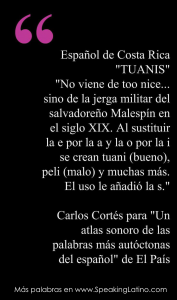Every country has a flag, food and symbols that identify them. But what about a single word? During the 6th International Congress of the Spanish Language (VI Congreso Internacional de la Lengua Española) celebrated in Panama, the blog Papeles Perdidos, created by the newspaper El País, published an atlas of the representative words of Spanish-speaking […]
una pata
In some Latin American countries like Peru, 'una pata' is a colloquial term used to refer to a friend or buddy. However, it can vary depending on the region. In its literal sense, it means 'a leg' or 'a paw'. Examples Spanish: Voy a salir a jugar fútbol con las patas. English: I am going […]
bastonera
Bastonera is a Spanish slang term often used in Latin America, particularly in Argentina and Uruguay. It refers to a female cheerleader or a girl who leads a marching band or parade, often with a baton. Examples Spanish: La bastonera del desfile estaba girando su bastón en formas impresionantes. English: The parade's baton twirler was […]
una teja
In some Latin American countries, 'una teja' is a slang term for 100 of something, usually money (e.g., 100 pesos). Examples Spanish: Me debes una teja por la cena de anoche. English: You owe me 100 (pesos) for last night's dinner.
soque!
An interjection used in Central American countries, especially Costa Rica, that is similar to 'hurry up' or 'come on'. Examples Spanish: ¡Soque, estamos tarde para la fiesta! English: Come on, we are late for the party!
Tico, tica
A colloquial term used in Central America, especially in Costa Rica, to refer to a native of Costa Rica. Examples Spanish: Mi mejor amigo es tico, nació y creció en Costa Rica. English: My best friend is a tico, he was born and raised in Costa Rica.
pura vida
A popular phrase in Costa Rica, literally translating to 'pure life'. It is used to express a positive outlook, to say 'everything's great', 'all good', or 'no worries'. Examples Spanish: ¡No te preocupes por eso, pura vida! English: Don't worry about that, all good!
mae
A term commonly used in Costa Rica, equivalent to 'dude' or 'mate'. It is used informally among friends or casual conversation. Examples Spanish: ¿Cómo estás, mae? English: How are you, dude?
Colacho
In Spain, 'Colacho' is a term that is mostly used to refer to the traditional Spanish custom known as 'El Colacho', where men dressed as the devil jump over babies born during the previous year. However, in some Latin American countries, 'Colacho' can be used as a nickname for someone named Nicolás. Examples Spanish: 1. […]
